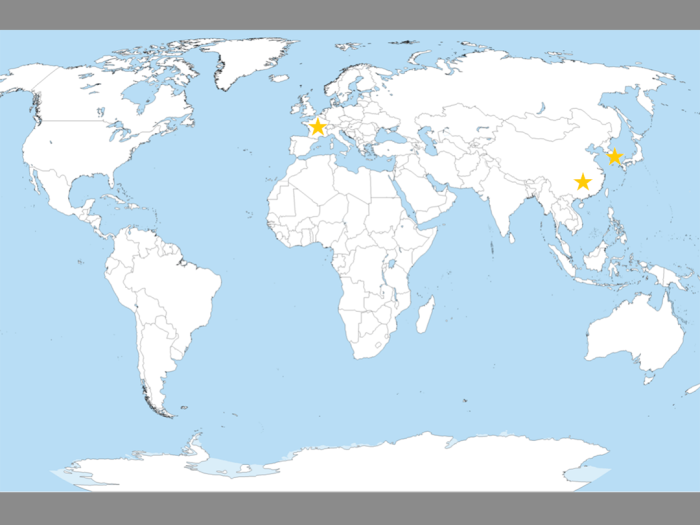
Available to mentor

Dr. Kayvan Najarian is a Professor in the Gilbert S. Omenn Department of Computational Medicine and Bioinformatics (DCMB) as well as the departments of Emergency Medicine and Electrical Engineering and Computer Science at the University of Michigan. He is the Director of the Biomedical and Clinical Informatics Laboratory (BCIL) and is an Associate Director for the Weil Institute for Critical Care Research and Innovation. Dr. Najarian is also an Associate Director for the Michigan Institute for Data Science (MIDAS), serving as the point person for data science collaboration in Biological Sciences and Health Sciences.
Dr. Najarian received his Ph.D. in Electrical and Computer Engineering from University of British Columbia, Canada, M.Sc in Biomedical Engineering from Amirkabir University, Iran, and B.Sc. in Electrical Engineering from Sharif University, Iran. The focus of Dr. Kayvan Najarian’s research is on the design of signal/image processing and machine learning methods to create computer-assisted clinical decision support systems that improve patient care and reduce the costs of healthcare.
Dr. Najarian’s lab also designs sensors to collect and analyze physiological signals and images. In particular, Dr. Najarian’s research focuses on creating decision support systems to manage traumatic brain injuries, traumatic pelvic/abdominal injuries and hemorrhagic shock, cardiac arrest and other critical care states.
Dr. Najarian’s research has been funded by agencies such as the National Science Foundation, the National Institutes of Health, and the Department of Defense. He serves as the Editor-in-Chief of Biomedical Engineering and Computational Biology and the Associate Editor of two other journals in the field of biomedical informatics. He is also a member of the editorial board of many other journals and serves as the guest editor of special issues for several journals in the field. Dr. Najarian has over 200 peer-reviewed journal and conference publications including a highly referenced textbook in the field of biomedical signal and image processing.
Najarian Lab
-
Center MemberInstitute for Healthcare Policy and Innovation
-
Center MemberCaswell Diabetes Institute
-
Center Membere-Health and Artificial Intelligence Initiative
Dr. Najarian, as the director of the Biomedical and Clinical Informatics Lab at the University of Michigan, is a distinguished researcher in the field of computational medicine, with a primary focus on leveraging artificial intelligence (AI) and machine learning (ML) for medical applications through clinical decision support systems and drug discovery and assessment. Resulting AI-based technologies for clinical decision support systems, which have been funded by agencies such as NSF, NIH, and DoD, feature advanced signal/image processing and ML techniques. In addition, he has collaborated with industry giants including J&J, BMS, and Toyota aimed at developing AI-based medical decision support systems for cardiovascular and gastrointestinal diseases. The success of these endeavors is evident in the licensing of these technologies to private companies, highlighting the real-world impact in advancing healthcare through computational medicine. Dr. Najarian is an Associate Director of the Michigan Institute for Data Science (MIDAS), focusing specifically on the integration of AI in healthcare and an Associate Director of the Weil Institute where he directs efforts toward AI applications in critical care. These roles signify Dr. Najarian’s commitment to driving innovation and improving patient outcomes through the implementation of cutting-edge AI technologies. Furthermore, as the Director of the Center for Data-Driven Drug Development and Treatment Assessment (DATA), an NSF IUCRC, Dr. Najarian coordinates all activities in this national center towards advancing the frontier of AI in drug development and contributes significantly to research in this field.
-
Alge OP, Pickard J, Zhang W, Cheng S, Derksen H, Omenn GS, Gryak J, VanEpps JS, Najarian K. Sci Rep, 2024 Aug 6; 14 (1): 18155Journal ArticleContinuous sepsis trajectory prediction using tensor-reduced physiological signals.
DOI:10.1038/s41598-024-68901-x PMID: 39103488 -
Zhang Y, Golbus JR, Wittrup E, Aaronson KD, Najarian K. BMC Med Inform Decis Mak, 2024 Feb 14; 24 (1): 53Journal ArticleEnhancing heart failure treatment decisions: interpretable machine learning models for advanced therapy eligibility prediction using EHR data.
DOI:10.1186/s12911-024-02453-y PMID: 38355512 -
Rajaei F, Toogood P, Jacob R, Baber M, Gough M, Derksen H, Wittrup E, Najarian K. Discover Artificial Intelligence, 2024 Dec 1; 4 (1):Journal ArticleIdentifying selective PDHK inhibitors using coupled tensor matrix completion and experimental validation
DOI:10.1007/s44163-024-00202-8 -
Gu F, Meyer AJ, Ježek F, Zhang S, Catalan T, Miller A, Schenk N, Sturgess V, Uceda D, Li R, Wittrup E, Hua X, Carlson BE, Tang Y-D, Raza F, Najarian K, Hummel SL, Beard DA. medRxiv,PreprintIdentification of Digital Twins to Guide Interpretable AI for Diagnosis and Prognosis in Heart Failure
DOI:10.1101/2024.11.11.24317106 -
Gao Z, Cheng S, Wittrup E, Gryak J, Najarian K. Artif Intell Med, 2024 Oct; 156: 102947Journal ArticleLearning using privileged information with logistic regression on acute respiratory distress syndrome detection.
DOI:10.1016/j.artmed.2024.102947 PMID: 39208711 -
Sun D, Macedonia C, Chen Z, Chandrasekaran S, Najarian K, Zhou S, Cernak T, Ellingrod VL, Jagadish HV, Marini B, Pai M, Violi A, Rech JC, Wang S, Li Y, Athey B, Omenn GS. J Med Chem, 2024 Sep 26; 67 (18): 16035 - 16055.Journal ArticleCan Machine Learning Overcome the 95% Failure Rate and Reality that Only 30% of Approved Cancer Drugs Meaningfully Extend Patient Survival?
DOI:10.1021/acs.jmedchem.4c01684 PMID: 39253942 -
Hodgman M, Minoccheri C, Mathis M, Wittrup E, Najarian K. Diagnostics (Basel), 2024 Aug 10; 14 (16):Journal ArticleA Comparison of Interpretable Machine Learning Approaches to Identify Outpatient Clinical Phenotypes Predictive of First Acute Myocardial Infarction.
DOI:10.3390/diagnostics14161741 PMID: 39202229 -
Gryak J, Georgievska A, Zhang J, Najarian K, Ravikumar R, Sanders G, Schuler CF. J Allergy Clin Immunol Glob, 2024 Aug; 3 (3): 100252Journal ArticlePrediction of pediatric peanut oral food challenge outcomes using machine learning.
DOI:10.1016/j.jacig.2024.100252 PMID: 38745865

